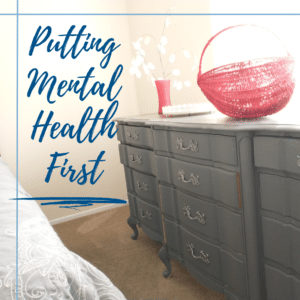By: Jennifer Mullen, Program Director
Who?

We work hard to destigmatize mental health and encourage everyone- families and staff alike- to prioritize it and care for themselves.
“I used to think that being vulnerable was a weakness, but not anymore. Now I see how it opened me up – I was able to express what I feared, how I felt, and that let (staff) understand me and help teach me how to do better and be different. It helped me move in the right direction.” -Saranam alumni
What?
We uphold a commitment to non-judgment, and we work from that principle to normalize taking care of our mental health. It is so important for us to create a safe space to heal, to examine yourself without shame, and ask for help.
From day one, we actively give the message that Saranam gives you the time to “work” on yourself – we encourage and take pride in the internal healing and changes that our parents and children make.
“This kind of work is waaay harder than passing a class. And acknowledging and celebrating those (victories) is extra important because no one gets a certificate for good work in therapy!” -Saranam Director of Family Services

Our supportive community model is built to encourage this healing. Living in community with each other not only provides relief for the isolation and loneliness that often accompanies homelessness, but it also provides daily, positive interactions that develops families’ feelings of value and worth.
Where?
Mental health is a central part of every pillar of our program. Apart from the work families do privately, reflection and understanding are paired with hands-on techniques throughout all of our curriculum. Some examples include:

In college success, we learn about the role stress plays in brain development, relationships, and the learning process. We discuss any personal barriers to learning and how we can use our past experiences to make education achievable and even enjoyable.
Our effective communication class gives both parents and children alike the tools to better communicate their needs and wants. By understanding how our communication and personality styles work together, we can better know how to interact with others and reduce frustration and anger.
In our Growth, Connection, and Community class, we encourage our students to use gardening as a relaxing, grounding technique to connect with our communities and invest in caring for the natural world.
When?
Mental health isn’t a finish line; it is something we work on for our entire lives. Learning appropriate tools at every stage of life helps us grow and adapt to challenges.

One of the most important things we can do is ensure parents are not pouring from an empty cup. Giving adults the know-how to access services and help, prioritize self-care and mindfulness, and set attainable goals reduces stress and builds resilience so they can give energy and attention to their children.
“My mindset is different because I’m not scared to accomplish things on my own anymore. I am on a much better relationship with myself. And I put that first now …and really put my best self into my goals for them and (me).” -Saranam alumni
We also give parents the agency to promote mental health in their homes. In our parenting classes parents learn about childhood development and gain context for their child’s behavior. This allows parents to effectively guide their children through life skills classes where they can layer tools onto their knowledge and practice together in a safe space. Over time these skills strengthen bonds, ease children’s anxiety, and even heal trauma.
“My parenting has improved – I have a better balance between my priorities and needing spend time with my son. I am more patient. I have better confidence, so I deal with (him) better.”- Saranam alumni.
The effect compounds over time. Children become less stressed with consistent care and attention, which trickles down into better behavior at home and higher gains at school. And as children become more stable, their parents feel more determined and capable of making these changes permanent.
At the end of the day, families succeed as a team.
Why?
Mental health is at the center of everything we do. We are better and more effective parents, students, employees, and community members when we feel safe, balanced, and confident.
As an organization dedicated to trauma-informed care, we know that healing from the adversity that we have experienced and learning from our setbacks enables us to start the next chapter of our story with strength and resilience.
If you or someone you know is struggling with mental health, please call SAMHSA’s national hotline or New Mexico Crisis Line.


